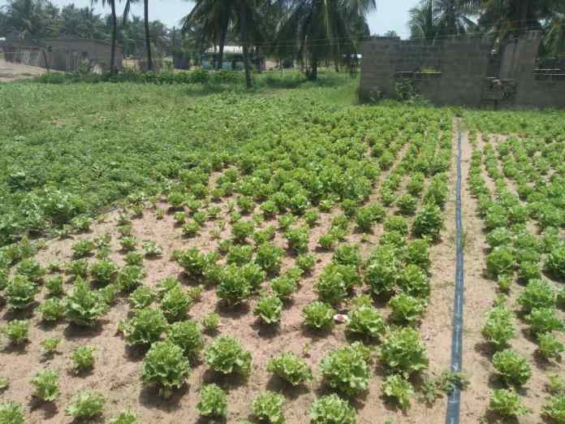
Audio By Carbonatix
Engineers at the Kwame Nkrumah University of Science and Technology (KNUST) are warning against consumption of vegetables grown along the Bibini River in Kumasi.
This is due to the detection of unsafe levels of heavy metals such as lead and cadmium and harmful bacteria.
The Bibini river is found within KNUST and is a tributary of Wiwi river.
It serves as a source of irrigation water for vegetables especially lettuce grown around the area.
Restaurants and food vendors in Kumasi and Accra purchase vegetables from farms along the Bibini river.
However, the river receives waste materials from a drain that has its content coming from a petroleum filling station, a car washing bay, gymnasium, hair salons, and greywater drains from adjoining hostels as well as drains from some KNUST engineering laboratories.
These activities result in the introduction of heavy metals and bacteria.
With time, these waste materials accumulate in agricultural soils and into food crops thus causing health problems.
The study therefore sought to find out the quality of the Bibini river used for irrigation and its impact on vegetable quality cultivated along the river.
The study published in the Journal of Environment & Ecosystem Science (EES) found the water from the river to be of low quality.
“The water quality indicators; dissolved oxygen, biochemical oxygen demand and water temperature were not within the recommended standards of Ghana’s Environmental Protection Agency,” lead investigator, Dr. Bennetta Koomson of the Department of Materials Engineering explained.
The research team also found that heavy metals including Cadmium, Lead and Chromium were present in the water, soil and vegetables.
Cadmium and lead found in vegetables were above the permissible limits.
Harmful bacteria were also found in the irrigation water as well as the lettuce.
“This makes them unsafe for human consumption as they can have adverse health implications on consumers.
“Microbial populations of faecal coliforms were found in the irrigation water as well as on vegetables produced beyond required levels indicating the vegetables produced are contaminated and of low quality hence can affect human life when consumed,” she said.
The team wants farmers to relocate to other areas to avert any future unfortunate events. “Farmers must be extensively educated and encouraged to relocate to other suitable farming land,” she advised.
Latest Stories
-
Controller issues March 15 ultimatum for Ghana Card verification
4 hours -
Six critically injured in gruesome head-on collision near Akrade
5 hours -
Gov’t to extradite foreign national who secretly filmed Ghanaian women to face prosecution – Sam George
6 hours -
U20 WWC: Black Princesses to play Uganda in final round of qualifiers
6 hours -
Burundi takes the helm as African Union declares ‘war’ on water scarcity
7 hours -
‘I will never forget you’ – Kennedy Agyapong thanks supporters, NPP delegates after primaries
8 hours -
Woman found dead in boyfriend’s room at Somanya
9 hours -
Woman feared dead after being swept away in Nima drain amid heavy rain
9 hours -
Court grants GH¢10k bail to trader who posed as soldier at 37 Military Hospital
10 hours -
Tano North MP secures funding to reconstruct decades-old Yamfo Market
10 hours -
Haruna Iddrisu discharged after road traffic accident
10 hours -
Kenyans drop flowers for Valentine’s bouquets of cash. Not everyone is impressed
10 hours -
Human trafficking and cyber fraud syndicate busted at Pokuase
10 hours -
Photos: First Lady attends African First Ladies for Development meeting in Ethiopia
11 hours -
2026 U20 WWCQ: Black Princesses beat South Africa to make final round
11 hours

